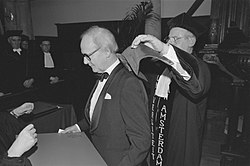Frank Kermode Quote
The great majority of interpretations of Apocalypse assume that the End is pretty near. Consequently the historical allegory is always having to be revised; time discredits it. And this is important. Apocalypse can be disconfirmed without being discredited. This is part of its extraordinary resilience. It can also absorb changing interests, rival apocalypses, such as the Sibylline writings. It is patient of change and of historiographical sophistications. It allows itself to be diffused, blended with other varieties of fiction--tragedy, for example, myths of Empire and of Decadence--and yet it can survive in very naïve forms. Probably the most sophisticated of us is capable at times of naïve reactions to the End.
The great majority of interpretations of Apocalypse assume that the End is pretty near. Consequently the historical allegory is always having to be revised; time discredits it. And this is important. Apocalypse can be disconfirmed without being discredited. This is part of its extraordinary resilience. It can also absorb changing interests, rival apocalypses, such as the Sibylline writings. It is patient of change and of historiographical sophistications. It allows itself to be diffused, blended with other varieties of fiction--tragedy, for example, myths of Empire and of Decadence--and yet it can survive in very naïve forms. Probably the most sophisticated of us is capable at times of naïve reactions to the End.
Related Quotes
About Frank Kermode
He was the Lord Northcliffe Professor of Modern English Literature at University College London and the King Edward VII Professor of English Literature at Cambridge University.
Kermode was known for many works of criticism, and also as editor of the popular Fontana Modern Masters series of introductions to modern thinkers. He was a regular contributor to the London Review of Books and The New York Review of Books.
